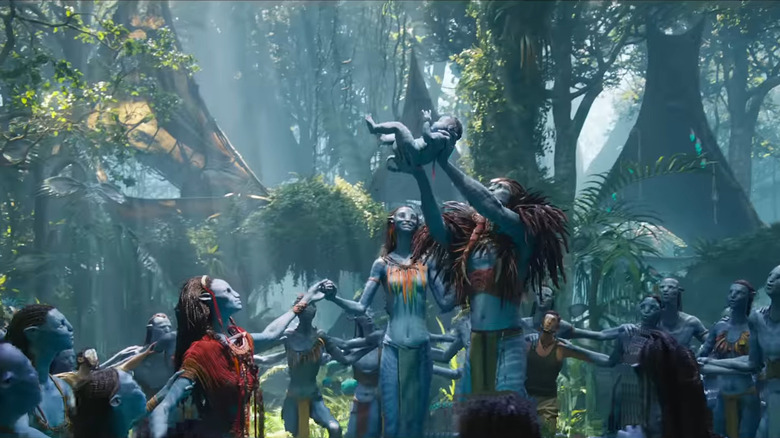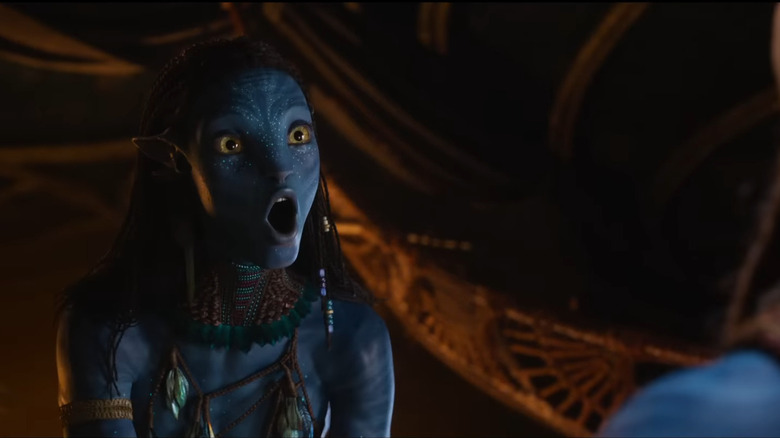Why Is There So Much English As Opposed To Na'vi In Avatar: The Way Of Water?
One of the things that made the original "Avatar" so impressive was the lengths James Cameron went to construct an entirely new world and culture. The Na'vi, the indigenous tribe of the moon Pandora, not only have all the markers of a complex society but there are notable elements of it that have been built out with impressive consistency.
Of particular note was the language, referred to as Lìʼfya leNaʼvi. As is now well-known, Cameron employed the skills of University of Southern California linguistics professor Paul Frommer to essentially build the language almost from scratch (via Unidentified Sound Objects). Frommer has continued to develop the language for "Avatar: The Way of Water" and will for subsequent sequels.
However, there is one major difference in how Na'vi is used between the two movies. Not in the language itself but in how we, the audience, experience it. In the first movie, we had to understand the language through subtitles when Na'vi spoke among themselves, though Jake Sully's (Sam Worthington) learning curve provides a good excuse for some of them to speak English and make it easy on us. In "The Way of Water," there is no such excuse. Na'vi is rarely spoken at all, and the inconsistency has some fans theorizing.
Lìʼfya leNaʼvi to English and back again
"In The Way of Water, it seems that James Cameron took the easy way out," wrote u/ArcaneSketches in the r/Avatar subreddit, "in a blink-and-you'll-miss-it moment, through Jake's narration as he explains briefly what has been going on, he says something along the lines of 'when I hear the language, I might as well be hearing English.'"
From there, u/ArcaneSketches explains, we are essentially "hearing Na'vi as English" just as Jake does. The only exceptions are when the Na'vi are in the presence of Quaritch (Stephen Lang), the Na'vi avatar instilled with the memories of the RDA colonel killed at the end of the first movie. Because Quaritch is not fluent in Na'vi, the post explains, we hear the language as it is.
Other comments, like that from u/najnovijialt, provide an even simpler explanation: "The language is dealt with the same way as the movie The 13th warrior. They are speaking Na'vi but we hear it as English and there is nothing wrong with it, its actually pretty smart." The movie they are referencing is 1999's "The 13th Warrior," which, taking place in medieval Bulgaria, should include not a word of English, but is pretty much entirely in English.
Shifting the linguistic lens
The challenge of convincingly portraying non-English speakers while also ensuring an English-speaking audience understands the dialogue is very real. Some, such as Mel Gibson's endlessly controversial "The Passion of the Christ," eschew English entirely in favor of the Hebrew and Latin that was spoken in Jerusalem at that point, as well as a rough approximation of Aramaic. The whole movie is subtitled.
One of the more creative and thematically consistent examples comes in 1990's Cold War spy thriller "The Hunt for Red October," which takes place almost entirely on a Soviet nuclear submarine. The first several minutes see the Russian characters speaking in Russian, with English subtitles below. But when one of them reads a Bible passage out loud, the language spoken onscreen abruptly switches to English at the word "Armageddon" — a word which, phonetically, is the same in both English and Russian.
For its part, the "Avatar" movies will likely face this challenge once again. A third installment is definitely happening, provided James Cameron can edit down the tulkun-sized nine-hour first cut of "Avatar 3." According to an interview at campfirewriting.com, Paul Frommer continues to be attached and continues to expand the Na'vi language. How it is integrated into the action onscreen is something we won't know until the release of "Avatar 3."


